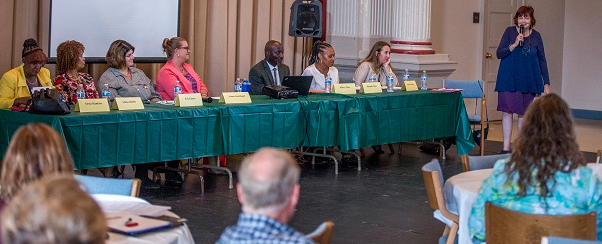
Ohio START connects family peer mentors to families impacted by parental drug abuse

In early 2017, the Voinovich School of Leadership and Public Affairs, in partnership with The Ohio State University (OSU), began an evaluation of a pilot program helping southern Ohio families affected by parental opioid abuse. Ohio START (Sobriety, Treatment, and Reducing Trauma) connects county Public Children Services Agencies (PCSAs), behavioral health providers and juvenile/family courts to provide specialized services, such as intensive trauma counseling for children and drug treatment for parents.
The group also advocates for an innovative approach to recovery: family peer mentorship. Family peer mentors are parents who have experienced and overcome addiction while working with the child welfare system, and who now serve as supporters. They help struggling families through the recovery process while connecting them to services such as state aid, food pantries and more.
Brianne Kindinger, a Richland County liaison with Helping Ohio Parent Effectively (HOPE), another program that uses parent mentors, explained the thinking behind the family peer mentorship program: “It’s a lot easier to relate to a parent who’s been there and done that.” In other words, parents who have overcome addiction are some of the best advocates for parents currently suffering.
Ohio START’s September 7 quarterly meeting, hosted by the Voinovich School at The Ridges Auditorium, brought together county PCSA directors, START staff and members of county teams to focus on the family peer mentorship program. Attendees learned more about the family peer mentor role, received a training on the technologies utilized by participating agencies and heard an update on the evaluation being conducted by OSU and the Voinovich School. The day’s main event, however, was a panel featuring both parents currently serving as supporters, as well as staff from programs currently using peer recovery support programs.
Panelist Alesia H. said her own experience with addiction taught her how important family peer mentors can be.
“I was one of those people who needed a peer supporter, but didn’t have one,” Alesia said. “That’s why I think it’s so important for me to be a family peer mentor. It’s very rewarding seeing people come out of their cocoons and turn into butterflies.”
Another panelist, Jeffrey Mays, said that his personal experience with addiction helps him to help families.
“I don’t work for the agency, I work for the parents,” Mays said. “We’re going to get through this together no matter how long it takes. The parents need help, and I know how to help, because I’ve had the same struggle.”
Panelist Beth Kinney, the supervisor of Summit County’s substance intervention unit, was able to share her personal successes using parent mentors.
“When we began using family peer supporters within our agency, our success rates increased dramatically,” said Kinney. “We had more families reuniting, less recidivism among the parents and we had many parents engage in treatment who we thought were lost. This is not a job I would want to do without my parent mentors, because it’s all about relationships.”
Fawn Gadel, the director of Ohio START with Public Children Services Association of Ohio, said she’s optimistic that participating agencies left feeling energized and ready to provide care.
“The panel demonstrated to our county agencies preparing to implement peer mentorship programs that the mentors can become an integral part of the children’s services program and really help parents to be successful,” Gadel said.


